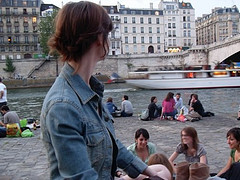Lauren Elkin sends this report from Hong Kong:
I had the best of intentions when I packed my books for this summer in Hong Kong, where my partner has just been transferred, and where I now plan to spend half the year (the other half I’m in Paris, where I live and teach): Roland Barthes’s “Carnets du voyage en Chine,” Jan Morris’s very fine history of Hong Kong, and a couple of novels that were referred to me, Gao Xingjian’s “Soul Mountain” and Yan Lianke’s “Serve the People” (which is banned in China). But I’m a promiscuous reader, susceptible to whatever feels most important to read right that moment, and my heart, as ever, is in England and France.
Right now I’m reading “The Mill on the Floss.” It’s put me in a very strange mood. What attracted me to it, however, is not only that it’s one of George Eliot’s greatest novels, but that Simone de Beauvoir loved it when she was a girl—she talks about it in “Memoirs d’une jeune fille rangée” and in her early journals, which were just published last year. I can see why she would be sentimentally attracted to it—the headstrong, misunderstood, brilliant daughter; the father who drives the family into ruin… Beauvoir’s family endured a similar fall in circumstances when she was about ten; her maternal grandfather went bankrupt and the family was ruined. (Which at the time meant they had to move to the rue de Rennes, I think it was, from the Boulevard Montparnasse.) I’m only halfway through, and Scott Esposito has warned me that the ending is a killer. So I may take my time getting there.
I’m also reading Antonia White’s “Frost in May,” a classic “school novel,” except this one finds a young girl called Nanda enrolled at a convent in England, where the very life of the girls is squeezed out of them in order to make them “not accomplished young women, nor agreeable wives, but soldiers of Christ, accustomed to hardship and ridicule and ingratitude.” Originally published in 1933. Elizabeth Bowen contributed a foreword in 1948, and said of it, “Antonia White’s style as a story-teller is as precise, clear, and unweighty as Jane Austen’s. Without a lapse from this style Antonia White traverses passages of which the only analogy is to be found in Joyce’s Portrait of the Artist as a Young Man” (vii). High praise. And directly relevant to my dissertation research.
Last week I read Sarah Waters’s “The Little Stranger,” which was disconcerting. So eerie and disturbing but such a fascinating place to linger that I didn’t want it to end. The final images of the book are haunting me.
As I’m in the middle of writing my dissertation chapter on Jean Rhys, I’m engrossed in reading and rereading her novels and short stories. I just finished “Voyage in the Dark” the other day. I hadn’t read it since college. I was surprised to find that it is highly modernist, fragmented and experimental, when the novels that come right before it and after it (“After Leaving Mr Mackenzie” and “Good Morning Midnight”) are more conventional—experimental in their own way, but not as overtly as “Voyage.” I think this is because “Voyage” is based so much more exactly on Rhys’s journals; it is the most autobiographical of all her novels, and in composing it Rhys must have left intact entire sections of her diaries, which I have not gone to see firsthand (they’re in Oklahoma), but which, I’ve heard, are mostly devoid of punctuation, segue, explanation, just stream of consciousness jottings of what happened.
I’m about to leave for Thailand for 10 days, where I will have nothing to do but sit by the pool and read, so I’m taking quite a stack of books: Nancy Mitford’s “Love in a Cold Climate,” Emmanuel Carrère’s “D’autres vies que la mienne,” Mathias Enard’s “Zone,” the second volume of Simone de Beauvoir’s memoirs, Geoff Dyer’s “Jeff in Venice, Death in Varanasi,” Andrei Codrescu’s “The Posthuman Dada Guide,” and Mavis Gallant’s “Green Water, Green Sky.”
When we move into our new apartment in September I’m planning on subscribing to the Asia Literary Review , which has been called the Granta of the East. Until then, I’m enjoying the free online content.


